Israelis march in east Jerusalem in test for new government
BY ILAN BEN ZION ASSOCIATED PRESS
JUNE 15, 2021

JERUSALEM
Hundreds of Israeli ultranationalists, some chanting “Death to Arabs,” paraded through east Jerusalem on Tuesday in a show of force that threatened to spark renewed violence just weeks after a war with Hamas militants in the Gaza Strip. Palestinians in Gaza responded by launching incendiary balloons that set at least 10 fires in southern Israel.
The march posed a test for Israel's fragile new government as well as the tenuous truce that ended last month's 11-day war between Israel and Hamas.
Palestinians consider the march, meant to celebrate Israel's capture of east Jerusalem in 1967, to be a provocation. Hamas called on Palestinians to “resist” the parade, a version of which helped ignite last month's 11-day Gaza war.
With music blaring, hundreds of Jewish nationalists gathered and moved in front of Damascus Gate. Most appeared to be young men, and many held blue-and-white Israeli flags as they danced and sang religious songs.
At one point, several dozen youths, jumping and waving their hands in their air, chanted: “Death to Arabs!” In another anti-Arab chant, they yelled: "May your village burn.”
The crowd, while boisterous, appeared to be much smaller than during last month's parade.
Ahead of the march, Israeli police cleared the area in front of Damascus Gate, shut down roads to traffic, ordered shops to close and sent away young Palestinian protesters. Palestinians said six people were arrested, and at five people were hurt in clashes with police.
The parade provided an early challenge for Israel's new prime minister, Naftali Bennett, a hardline Israeli nationalist who has promised a pragmatic approach as he presides over a delicate, diverse coalition government.
Though there were concerns the march would raise tensions, canceling it would have opened Bennett and other right-wing members of the coalition to intense criticism from those who would view it as a capitulation to Hamas. The coalition was sworn in on Sunday and includes parties from across the political spectrum, including a small Arab party.
Mansour Abbas, whose Raam party is the first Arab faction to join an Israeli coalition, said the march was “an attempt to set the region on fire for political aims,” with the intention of undermining the new government.
Abbas said the police and public security minister should have canceled the event. “I call on all sides not to be dragged into an escalation and maintain maximum restraint,” he said.

Instead, marchers were to walk around the ancient walls of the Old City and enter through Jaffa Gate, a main thoroughfare for tourists, and head toward the Jewish Quarter and Western Wall, the holiest site where Jews can pray.
Damascus Gate is a focal point of Palestinian life in east Jerusalem. Palestinian protesters repeatedly clashed with Israeli police over restrictions on public gatherings during the Muslim holy month of Ramadan in April and May.
Those clashes eventually spread to the Al-Aqsa Mosque compound, a flashpoint site sacred to Jews and Muslims. Tensions at the time were further fueled by protests over the threatened eviction of dozens of Palestinian families by Jewish settlers, also in Jerusalem.
At the height of those tensions, on May 10, Israeli ultranationalists held their annual flag parade. While it was diverted from the Damascus Gate at the last minute, it was seen by Palestinians as an unwelcome celebration of Israeli control over what they view as their capital.
In the name of defending the holy city, Hamas fired long-range rockets at Jerusalem, disrupting the march and sparking the Gaza war, which claimed more than 250 Palestinian lives and killed 13 people in Israel.
After capturing east Jerusalem in 1967, Israel annexed the in a move not recognized by most of the international community. It considers the entire city its capital, while the Palestinians want east Jerusalem to be the capital of their future state. The competing claims over east Jerusalem, home to sensitive Jewish, Christian and Muslim holy sites, lie at the heart of the conflict and have sparked many rounds of violence.
Ahead of the march, Hamas called on Palestinians to show “valiant resistance” to the march. It urged people to gather in the Old City and at the Al-Aqsa Mosque to “rise up in the face of the occupier and resist it by all means to stop its crimes and arrogance.”

On Tuesday afternoon, Hamas-linked Palestinians launched a number of incendiary balloons from Gaza, setting off at least 10 blazes in southern Israel, according to Israel's national fire department.
Abu Malek, one of the young men launching the balloons, said called the move “an initial response” to the march.
Prime Minister Mohammad Shtayyeh, of the internationally backed Palestinian Authority in the West Bank, called the march an “aggression against our people.”
Israeli media reported the military was on heightened alert in the occupied West Bank and along the Gaza frontier in case of violence. Batteries of Israel's Iron Dome rocket-defense system were seen deployed near the southern town of Netivot, near the Gaza border, as a precaution. Hundreds of police will also be deployed.
Defense Minister Benny Gantz met with the military chief of staff, the police commissioner and other senior security officials on Tuesday. He “underscored the need to avoid friction and protect the personal safety of ... Jews and Arabs alike.”
U.N. deputy spokesman Farhan Haq said U.N. officials have urged all sides to avoid “provocations” in order to solidify the informal cease-fire that halted the Gaza war.


Israel-Palestine: Beatings, arrests and chants of 'Death to Arabs' at far-right march in Jerusalem's Old City
Israeli police shut symbolic Damascus Gate and beat and arrest Palestinians as twice-postponed parade goes ahead, with far-right Israelis chanting 'Death to Arabs' and Palestinians calling for 'day of rage'

Israeli security forces disperse Palestinians near Damascus Gate in East Jerusalem on 15 June 2021 (AFP)
By Shady Giorgio in Jerusalem
Published date: 15 June 2021
Israeli police beat and arrested Palestinians on Tuesday, after closing Damascus Gate to make way for at least a thousand Israelis gathering for the start of a provocative nationalist march through occupied East Jerusalem's Old City, in the first major test for Israel's new government.
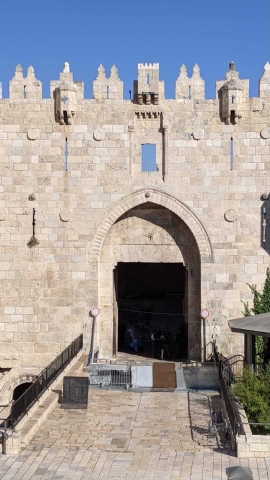
Having closed off certain roads and Damascus Gate, Israeli police arrested Palestinians in Jerusalem ahead of the march. A video posted on Twitter showed Israeli police officers beating a Palestinian on the steps by Damascus Gate.
The Red Crescent said that 27 people were wounded during confrontations with Israeli authorities around the Old City of Jerusalem, including three from rubber-coated steel bullets, one from being beaten and one who had been hit by part of a sound grenade. Two people were hospitalised.
Authorities beat vendors working in shops near Damascus Gate, and pushed them away from the Old City. The whole area around the gate was sealed off by early afternoon on Tuesday, except for members of the press, with several barricades set up to clear the way for the settlers' march.
AFP reported that more than a thousand Israelis waving national flags gathered at the basin of Damascus Gate at the start of the march, singing anthems of the Jewish state's settler movement.
Videos on social media showed Israelis waving flags chanting "Death to Arabs".
Some hoisted far-right lawmaker and Benjamin Netanyahu ally Itamar Ben-Gvir, and Bezalel Smotrich, leader of the far-right Religious Zionism faction, on their shoulders, AFP reported.

Israeli authorities raised the alert level in the country ahead of the march, with additional police and military forces set to be deployed near the besieged Gaza Strip and in towns in Israel with mixed populations of Jewish and Palestinian citizens.
By Tuesday afternoon, a small number of incendiary balloons had been sent from Gaza into Israel, with 20 fires reported along the Gaza border.
Israeli authorities also diverted flights towards the "Northern Route" in and out of Israel, in anticipation of a possible escalation in Gaza.
The march is set to run along the Old City's wall from Damascus Gate to Jaffa Gate, before heading towards the Western Wall.
Palestinian counter-protesters are also expected in Jerusalem and in towns in Israel with significant numbers of Palestinians, with some Palestinian groups calling for a “day of rage” denouncing the far-right march.
New government’s first test
The Flag March is usually held on the occasion of Jerusalem Day, which marks Israel’s capture and subsequent occupation of East Jerusalem in the 1967 Middle East war.
The march typically brings together thousands of young, far-right religious Israelis, who chant anti-Palestinian slogans and wave Israeli flags as they pass through the small streets of East Jerusalem's Old City.
Initially scheduled for 10 May, the route of the Flag March had been diverted away from the flashpoint of Damascus Gate amid Palestinian protests against the planned forcible removal of Palestinians from the Sheikh Jarrah neighbourhood, and Israeli forces' violent raids at al-Aqsa Mosque.

The Israeli ‘Flag March’ explained Read More »
The march was called off that day, as sirens went off after Hamas fired four rockets from Gaza towards Jerusalem when Israel ignored its ultimatum calling on Israeli forces to withdraw from al-Aqsa.
Over the following 11 days, Israeli forces and Hamas engaged in a war that would leave 248 people in Gaza dead and 13 in Israel.
The procession was later rescheduled for 10 June, but once again postponed after Hamas warned of renewed hostilities should it proceed.
The new date for the march was set on 8 June by the cabinet of then-Prime Minister Benjamin Netanyahu, who was voted out by Israel’s parliament on Sunday after 12 years as premier.
Netanyahu has been replaced by his former protege turned rival, the far-right, pro-settlement Jewish nationalist and tech millionaire Naftali Bennett, 49.
The Flag March will be the first test for Bennett’s fragile coalition government, cobbled together by the secular centrist Yair Lapid, a former TV presenter, and including eight parties, ranging from Bennett's far-right Yamina Party to left-wing Labor and an Islamist party representing Palestinian citizens of Israel.
While Bennett is a prominent member of Israel’s far-right, Netanyahu has labelled the new cabinet as a "dangerous" “left-wing” government, and accused it of being "the greatest election fraud in the history" of Israel.
'A provocation against our people'
Jewish supremacists, including Israeli MP Itamar Ben-Gvir, have meanwhile vowed to participate in the march regardless of what the new government - or Palestinians - might say.

Israel's incoming government is so unnatural only Netanyahu can keep it
“I will arrive today to participate in the flag parade and I will fly the Israeli flag,” he wrote on Twitter on Tuesday morning. “We do not need permission from Hamas or the Islamic Jihad to march in the capital of Israel.”
Palestinian Authority Prime Minister Mohammad Shtayyeh has condemned the march as "a provocation and aggression against our people, Jerusalem and its sanctities that must end".
"We warn of the dangerous repercussions that may result from the occupying power's intention to allow extremist Israeli settlers to carry out the Flag March in occupied Jerusalem tomorrow," Shtayyeh tweeted on Monday.
In April, Israeli settlers had already marched in the streets of Jerusalem’s Old City chanting “Death to Arabs”, sparking riots.
Tensions Raised Ahead of Jerusalem Flag March
by Reuters and Algemeiner Staff

Israeli police detain a Palestinian man during clashes that erupted ahead of a flag-waving procession by far-right youth, at Jerusalem’s Old City, June 15, 2021. REUTERS/Ammar Awad
Right-wing Israeli groups plan to march in eastern Jerusalem on Tuesday in a flag-waving procession that risks reigniting tensions with Palestinians and poses an early test for Israel’s new government.
Several hours before the event was due to start, incendiary balloons launched from Gaza caused several fires in fields in Israeli communities near the border with the Palestinian enclave, witnesses and the Israeli fire brigade said.
Such incidents had stopped with a ceasefire that ended 11 days of cross-border fighting last month between Palestinian militants in Hamas-ruled Gaza and the Israeli military.
The marchers hope to pass through Jerusalem’s walled Old City, which is home to shrines sacred to Judaism, Islam and Christianity and is the most sensitive site in the Israeli-Palestinian conflict.
But a route of blocked-off streets published by police showed that marchers would not go through Damascus Gate, the main entry to the Muslim quarter, in an apparent attempt by Israeli authorities to avoid friction with Palestinians.
Assailing the march as a “provocation,” Palestinians called for “Day of Rage” protests in Gaza and the West Bank, with memories still fresh of confrontations between Israeli police and Palestinians during the Muslim holy month of Ramadan.
“We warn of the dangerous repercussions that may result from the occupying power’s intention to allow extremist Israeli settlers to carry out the Flag March in occupied Jerusalem,” Palestinian Prime Minister Mohammad Shtayyeh said.
The march was originally scheduled for May 10 as part of “Jerusalem Day” festivities that celebrate Israel’s capture of eastern Jerusalem in the 1967 Middle East war.
At the last minute it was diverted away from Damascus Gate and the Muslim Quarter but even after the re-routing it helped trigger last month’s fighting.
The march is being held by Israeli rightists who were angered that the procession in May was diverted from its traditional route and accused former Prime Minister Benjamin Netanyahu’s government of caving in to Hamas.
Hamas warned of renewed hostilities over the march, which Israel’s internal security minister approved on Monday. It is scheduled for 6 p.m.
“We will march, thousands of us, with flags where we’re told. Anywhere we’re told not to march — we won’t march,” Matan Peleg, one of the march organizers, told Israel’s Army Radio.
Diplomats urged restraint by all sides.
“Tensions (are) rising again in Jerusalem at a very fragile & sensitive security & political time, when UN & Egypt are actively engaged in solidifying the ceasefire,” UN Middle East envoy Tor Wennesland said on Twitter.
He urged all sides to “act responsibly & avoid any provocations that could lead to another round of confrontation.”
TEST FOR BENNETT
The march poses a challenge for new Prime Minister Naftali Bennett and his alliance of right-wing, centrist, left-wing and Arab parties, who took office on Sunday and ended Netanyahu’s long rule.
Bennett heads a right-wing party and diverting the procession could anger members of his religious base and expose him to accusations he was giving Hamas veto power over events in Jerusalem.
Palestinian protests were planned for 6 p.m. across Gaza. Hamas and Palestinian President Mahmoud Abbas’s Fatah faction have called on Palestinians to flock to the Old City to counter the march.
Israeli Defense Minister Benny Gantz met police, military and intelligence chiefs on Tuesday and “underscored the need to avoid friction and protect the personal safety of Israel’s citizens, Jews and Arabs alike,” his office said.
‘Death to Arabs’: Nationalist Jerusalem flag march held under ramped up security
Lapid slams ‘disgrace’ of racist chant; 33 Palestinians said hurt in police clashes; signs say ‘Bennett the liar’; flights rerouted amid Gaza threats; arson balloons spark 20 fires
Thousands of right-wing nationalists marched through parts of Jerusalem’s Old City on Tuesday under a heavy police presence, as Israeli security forces braced for possible fresh violence from Gaza amid threats from terror groups in the coastal enclave.
Police estimated turnout at 5,000 participants and some 2,000 officers were deployed across the city for the event.
Footage posted to social media showed the right-wing marchers chanting “Death to Arabs” as well as “Shuafat is on fire,” referring to the East Jerusalem neighborhood, and “Jerusalem is ours.”
While voicing support for the decision to approve the march, Foreign Minister Yair Lapid denounced the chants of “Death to Arabs.”
“The fact that there are extremist elements for whom the flag of Israel represents hate and racism is revolting and unforgivable,” Lapid tweeted. “It is incomprehensible that people can hold the Israeli flag in one hand and shout ‘Death to Arabs’ at the same time. This isn’t Judaism or Israeliness, and it is definitely not what our flag symbolizes. These people are a disgrace to the nation of Israel.
The parade, the first major test of the new government sworn in Sunday, was rescheduled after the original Flag March was halted on Jerusalem Day, May 10, when the Gaza Strip’s Hamas rulers fired rockets at Jerusalem.
As the march began just before 6 p.m., clashes broke out near the Old City between police and Palestinians, 33 of whom the Palestinian Red Crescent said it treated. Six of the injured were hospitalized for wounds from rubber or sponge-tipped bullets, according to the medical service, which also said another Palestinian was injured by live fire, but that police were preventing them from evacuating him for treatment.
Video showed Palestinians throwing rocks at mounted police officers and one fell off his horse.
Police arrested 17 people on suspicion of disturbing the peace, throwing rocks and assaulting officers. Two cops were injured and taken for medical treatment, according to police.
The clashes came as marchers gathered on Jerusalem’s Hanevi’im Street, from where they headed toward the Damascus Gate, a flashpoint in the Old City. As part of the route agreed upon with police, the marchers weren’t permitted to pass through the gate but could go past it, with some participants allowed to go down to the plaza just outside the gate.
The marchers then entered the Old City via the Jaffa Gate and marched toward the Western Wall.
A number of participants accosted Arab journalists, with a reporter sharing video showing marchers shouting curses at them, and one man spitting in their direction.
Some of the marchers chanted against Prime Minister Naftali Bennett and posters were seen depicting the new premier alongside the text “Bennett the liar.”
The posters apparently referred to Bennett’s breaking of his pre-election pledge not to form a government in which he switched off the premiership with Yair Lapid and not to rely on the Islamist Ra’am party’s support.
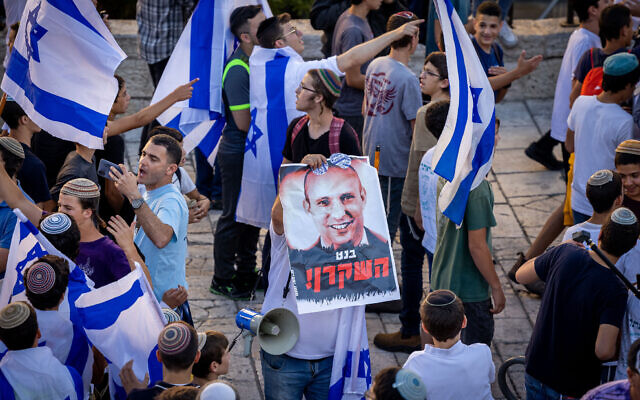
Several far-right lawmakers opposed to the government took part in the march, among them Religious Zionism leader Bezalel Smotrich and his faction’s lawmakers Itamar Ben Gvir and Orit Struck.
MKs May Golan and Shlomo Karhi of former prime minister Benjamin Netanyahu’s Likud party were also taking part, with video showing the latter dancing with Smotrich outside the Damascus Gate.
Lawmakers from the Joint List rallied outside the Old City to denounce the march, with the predominantly Arab political alliance’s leader Ayman Odeh saying that the Israeli capital will one day be the capital of a Palestinian state.
“On these walls the flag of Palestine will be hoisted and Jerusalem will be the capital of recaptured Palestine,” he told the Kan public broadcaster.
“Our people will cause them to be ashamed and withdraw from these places,” he said, referring to the Jewish marchers in the parade.
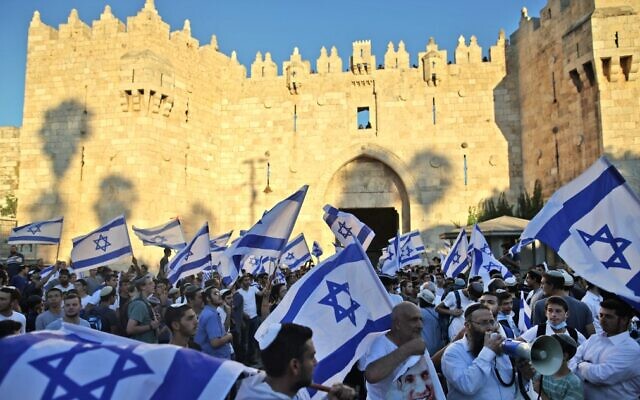
Ra’am chief Mansour Abbas, whose Islamist party is part of the diverse ruling coalition, earlier called the march an “unbridled provocation” and said it should have been canceled.
Meanwhile, the Israel Defense Forces deployed Iron Dome missile defense batteries outside Jerusalem ahead of the march, according to Palestinian media reports. The IDF also deployed Iron Dome batteries elsewhere in the country and sent reinforcements to the West Bank.
Flight trackers showed air traffic to and from Ben Gurion Airport was being rerouted northward further away from Gaza to avoid any potential rocket fire.
The apparent precautions came as numerous blazes were sparked in southern Israel near Gaza, with fire services reporting at least 20 were sparked by balloon-borne incendiary devices launched from the Strip.
An explosive device attached to one balloon exploded over a kibbutz in the Sha’ar Hanegev Regional Council, startling children in a playground, according to Hebrew media reports. The children were said to have run to a bomb shelter after hearing the blast and there were no reports of injuries.
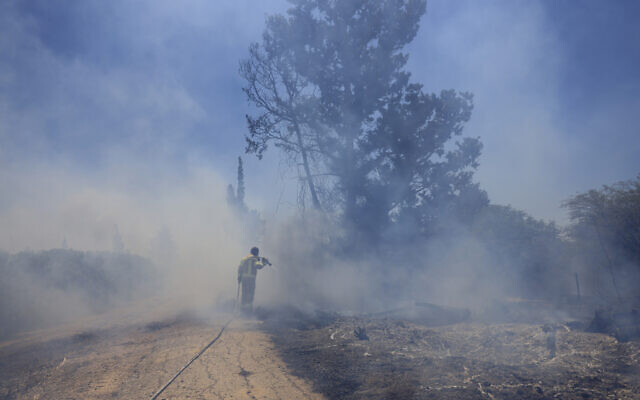
Clashes also broke out between dozens of Palestinian protesters and IDF troops on the Gaza border. One Palestinian was reportedly shot in the leg, suffering light injuries.
The IDF has been bracing for a resurgence in Gaza fighting and a flare-up of clashes across the West Bank following Palestinian threats of violence if the march went ahead.
Amid Tuesday’s violent incidents around Gaza, Channel 13 news cited unnamed Palestinian sources saying Egypt had asked Hamas not to cause an escalation, warning that such a move would “embarrass” Cairo and that Bennett’s government — which approved the parade on Monday — would respond forcefully.
According to the sources, Hamas responded that “all options are on the table” but escalation could be avoided “if the event doesn’t get out of control.”
Later in the evening, Channel 12 news said Israel warned Hamas via Egypt that it would there would be a tough and immediate response to any rocket fire from Gaza. The network quoted a diplomatic source vowing Israel would respond to the arson balloon attacks, but would pick the timing.
The report said Israel warned Hamas that any escalation in violence would jeopardize understandings on allowing goods into Gaza and improving conditions there that the Egyptians are trying to broker, while signaling it made efforts to ensure the march would not go through the Old City’s Muslim Quarter.
The network also asked the diplomatic source what Bennett would now do as prime minister in light of hawkish comments he has previously made.
“On the one hand there are doubts, we want to show that there really is a new equation here like we promised after Operation Guardian of the Walls,” the source said. “On the other hand, we don’t want to create the connection that Hamas wants us to create between Gaza and Jerusalem. There will be a response and it will be expressed in a variety of forms.”
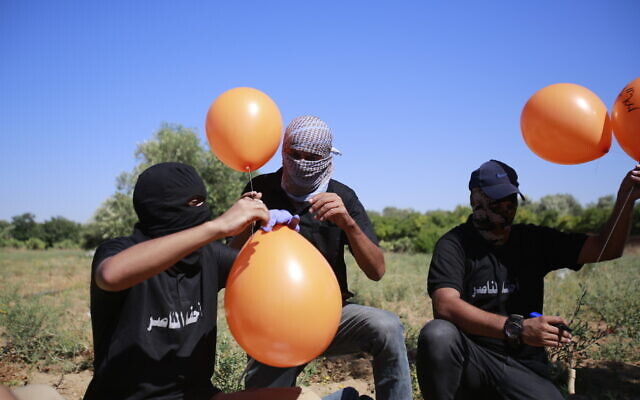
The May 10 — Jerusalem Day — rocket attack during the original parade, which came amid already rising tensions over planned East Jerusalem home evictions and police actions against Muslim rioters on the Temple Mount, touched off 11 days of intense fighting between Israel and Hamas-led terrorists in the Gaza Strip, as well as a rash of lower-level clashes in the West Bank and mob violence between Arabs and Jews inside Israel.
Since the fighting ended, Hamas has repeatedly warned that it could reopen hostilities over developments in Jerusalem, and has responded with increased belligerence to plans for the march, an annual event — held to mark Israel’s 1967 capture of East Jerusalem — during which thousands of nationalist youths parade through the Muslim Quarter of the Old City toward the Western Wall.
The rescheduled event was initially planned for last Thursday, but was postponed to this Tuesday when police refused to authorize its planned route through the Old City’s Damascus Gate entrance and Muslim Quarter.

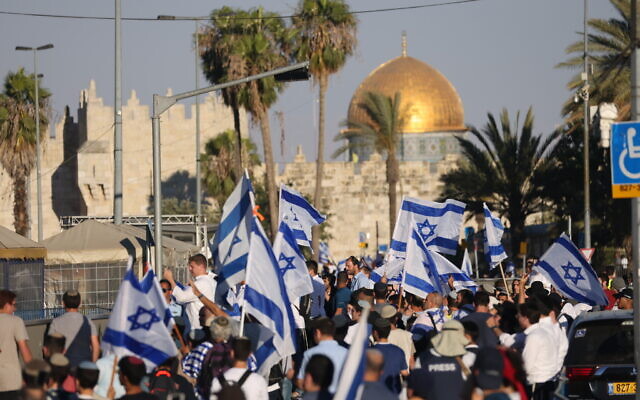
No comments:
Post a Comment